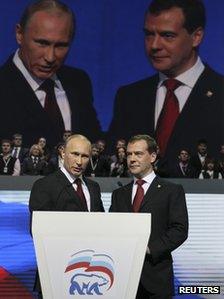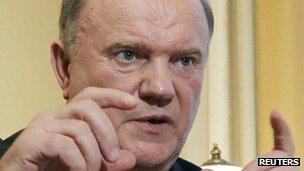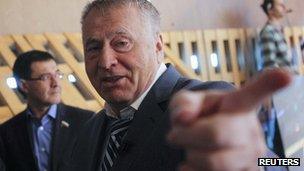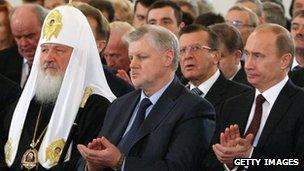Russia parliament elections: How the parties line up
- Published
Russians go to the polls on Sunday in a parliamentary election which is expected to deliver a much reduced majority for the ruling United Russia party.
BBC Monitoring profiles the seven parties seeking to win seats in the lower house of parliament, the State Duma.
United Russia
United Russia, chaired by Prime Minister Vladimir Putin, is Russia's ruling party and has dominated national and regional legislatures for the best part of a decade.

United Russia is expected to dominate the new State Duma
The party currently controls 315 of the 450 seats in the State Duma, which gives it the two-thirds majority it needs to pass changes to the Russian constitution if required.
United Russia is unflinching in its support of the Kremlin, and of Mr Putin personally. Russia's prime minister has accepted the party's nomination to run for president next year, while the current president, Dmitry Medvedev, has agreed to be the party's top parliamentary candidate.
Mr Medvedev is expected to take over as prime minister after the presidential election, in what is effectively a job swap with Mr Putin.
The party advocates political and socio-economic stability and the revival of Russia's status as a superpower. It describes itself as centrist and conservative, basing its ideology on traditional Russian values and the notion of Russia's unique identity.
Communist Party of the Russian Federation (CPRF)
The CPRF, the ideological successor to the Communist Party of the Soviet Union, is by far the biggest and most popular left-wing party in Russia.

Mr Zyuganov has led the Communists since 1993
Led by Gennady Zyuganov since it was founded in 1993, the party has the second largest number of MPs in the State Duma, with 57.
The CPRF draws much of its support from older and middle-aged working-class people and pensioners, especially in rural areas, although it has recently been making a concerted effort to recruit younger activists and voters as well. The party still uses Soviet-era rhetoric to condemn capitalism, and places a strong focus on Russian identity and patriotism.
Liberal Democratic Party of Russia (LDPR)
The LDPR is the third largest party in the lower house, with 40 MPs, and is led by one of the great survivors of Russian politics, populist firebrand Vladimir Zhirinovsky.
The party does not tend to criticise either Mr Putin or Mr Medvedev explicitly.

Vladimir Zhirinovsky's Liberal Democratic Party is openly anti-Western
The LDPR is essentially a political vehicle for Mr Zhirinovsky, whose views have changed over the years but can broadly be described as populist.
In the run-up to this election, the party has been highlighting the need to defend the interests of ethnic Russians, although it has generally been careful not to cross the line into openly nationalist rhetoric.
It describes itself as the only truly right-wing party in Russia, supports a strong state, campaigns against "the erosion of state and morality" and is openly anti-Western.
LDPR's main supporters are mostly lower-income men, predominantly from small towns and rural areas.
A Just Russia
A Just Russia is currently the smallest of the four parliamentary groups in the State Duma, with 38 MPs.
Led by the former speaker of the upper house, Sergei Mironov, it was set up in 2006 as a social democratic counterweight to United Russia with the apparent involvement of the Kremlin, but it has recently suffered a series of setbacks which have put its future in doubt.

Sergei Mironov (C) has become a fierce opponent of United Russia
A Just Russia uses moderate left-wing slogans promoting social justice, order and stability. Traditionally supportive of both Mr Medvedev and Mr Putin, the party has recently been repositioning itself as a fierce opponent of United Russia.
Mr Mironov was one of a number of members of the Duma who remained seated when Mr Putin visited the lower house of parliament earlier this month.
Yabloko
Once one of the standard-bearers of the pro-democracy camp in Russia, Yabloko has long since fallen from prominence. The party has kept a relatively low profile in recent years, mainly taking part in various human rights, environmental and anti-corruption protests and campaigns. It currently has no representation in parliament.
Yabloko's ideology is a mix of liberalism and social democracy. It promotes democratic values and human rights and is generally in favour of a market economy.
The party's first leader and co-founder, Grigory Yavlinsky, has come out of political semi-retirement to head its list of election candidates. The party is supported mainly by urban liberal intellectuals.
Right Cause
Right Cause is the newest of Russia's registered parties, set up following the last parliamentary election in 2007. It was briefly headed by one of Russia's richest men, industrialist Mikhail Prokhorov, but following his ousting as party leader in September 2011, it has slid from public view.
Right Cause portrays itself as the only recognised liberal centre-right force in Russia, and advocates a reduction in the size of the public sector. Right Cause also sets itself apart by adopting a clear pro-Western stance; its election manifesto includes a pledge to launch a bid for EU membership.
Right Cause's voters are mainly well-educated businessmen and private sector employees.
Patriots of Russia
Founded and led by Gennady Semigin, a businessman and former member of the CPRF, Patriots of Russia has never had any parliamentary representation. The party was set up as a modern alternative to the CPRF, and its ideology and platform includes a mix of patriotism, socialism and belief in the benefits of a strong state.
The party has never enjoyed significant popular support.
BBC Monitoring, externalselects and translates news from radio, television, press, news agencies and the internet from 150 countries in more than 70 languages. It is based in Caversham, UK, and has several bureaux abroad.